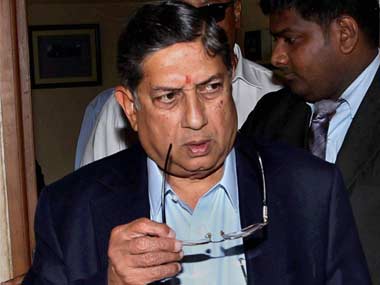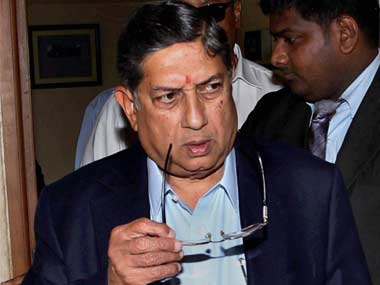In a sense, we have been here before. Four years ago the Supreme Court heard a case filed by former BCCI president AC Muthiah challenging the board’s constitutional amendment that allowed Srinivasan to buy the Chennai Super Kings in 2008. At the time, one of the two judges had some particularly harsh observations to make about N Srinivasan, the IPL and conflict of interest. “Can a person be a judge of his own case?" Justice Gyan Sudha Mishra asked the late Ghulam Vahanvati, who was defending the BCCI. “I am hearing the matter relating to the controversy. But can I participate in the bidding of IPL teams tomorrow? [caption id=“attachment_1819547” align=“alignleft” width=“380”]  BCCI president may or may not find himself in trouble. PTI[/caption] “You introduce an amendment where the IPL will be an exception. You are a prominent industrialist holding a key position in the board and have a stake in the bidding. In order to avoid suspicion and be above board, you should have got your membership suspended. “Our nagging question is: can you continue in a dual capacity? That is the core issue. We are proceeding on the footing that you had a bar on any dual status before your blanket amendment was brought. “We want to know what grave prejudice will be caused to you if we pass an order that you can either continue as the owner of the IPL team or contest the BCCI election,” Justice Mishra said. Srinivasan was BCCI secretary, not president, at the time but clearly the observations did not lead to an order against him. Instead, the court reserved judgement on the case five days later. Then, seven months after those observations, the court passed a split verdict, leading to the petition being referred to the chief justice for allocation to a larger bench. That larger bench was never convened, allowing Srinivasan to rise to BCCI president unimpeded and setting in motion a chain of events that led to Monday’s proceedings. The Supreme Court had equally pointed comments to make about Srinivasan this time around too. ESPNcricinfo reports that the court told his lawyers: “You are assuming that the [Mudgal Committee] report has cleared you. You can’t use BCCI rules to say that you will stand for elections, because the doctrine of public trust will apply.” Justice TS Thakur even went so far as to say Srinivasan should not rely only on the conclusions of the Mudgal reports. “The report says you are not involved in betting or fixing or in stalling the investigation,” Justice Thakur said. “But you have to ask whether despite those findings, you are an owner of a team which is playing, you are related to an individual who is found in betting. Will that not affect your status as member of the BCCI?” According to ESPNcricinfo, Justice Thakur went to say that the Court doesn’t expect anyone to confess but there would be “consequences arising from the inferences contained in the report. “‘That you cannot escape,’” he said. What those consequences might be the court has implied but not made clear but observations, even ones as pointed as these, can’t compel the board or Srinivasan to act. Only actual orders can do that. Unless the Supreme Court expressly disqualifies Srinivasan from owning an IPL team as BCCI president, it would be naive to expect him or the BCCI to change the status quo. In any case, very few people willingly give up positions of power and influence. That’s just human nature. To except otherwise would be foolish. The Court’s observations are, of course, welcome but it is their orders that will make all the difference.
Unless the Supreme Court expressly disqualifies Srinivasan from owning an IPL team as BCCI president, it would be naive to expect him or the BCCI to change the status quo.
Advertisement
End of Article
Written by Tariq Engineer
Tariq Engineer is a sports tragic who willingly forgoes sleep for the pleasure of watching live events around the globe on television. His dream is to attend all four tennis Grand Slams and all four golf Grand Slams in the same year, though he is prepared to settle for Wimbledon and the Masters. see more


)

)
)
)
)
)
)
)
)



